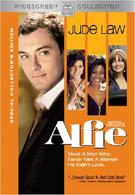What do you get when you throw a young, poor, single playboy with big dreams and an even bigger libido into a city full of women who just can’t seem to get enough of him? Pretty much the same thing you got back in the sixties, only with a little more sex and a lot less heart. Welcome to world of Alfie. He’s a cocky fellow with a cockney accent and a penchant for thinking with his, well…you know. A ladies’ man to the ‘T’, there isn’t a woman alive that he can’t charm and he darn well knows it. Hardly a role model of any sort, he’s a bloomin’ Rembrandt of womanizers and when it comes to wooing the fairer sex he shows no trepidation. Strike that. He has one fear: being tied down to any one of them.
When you settle into the film (which is a remake of the 1966 movie by the same name) you quickly learn that you are Alfie’s best friend, his confidant, and the person he’s going to be perfectly honest with no matter what. He talks to you directly, sharing his innermost thoughts and desires.
Eventually you start to realize that you are the only person he’s being perfectly honest with. He isn’t even that honest with himself. You get to be the only source of objectivity as he wades his way through five relationships with completely different women. Each of the five relationships reflects a different situation in life and each woman represents something Alfie wants out of that life. Along the way he finds he is unprepared to deal with the consequences that come with taking but being unwilling to give.
It’s Alfie’s honesty towards the audience that made this movie work in the sixties, and it’s what makes it work now. It’s a trip into the life, mind and emotions of a man who wants the most out of life but can’t seem to stop himself from making all the wrong choices.
Alfie is as much an update as it is a remake of the 1966 version starring Michael Caine. Interestingly enough, the type of guy Alfie is hasn’t changed that much in forty years, but the world around him has, especially the women. Generally I don’t care much for remakes, but a rehashed Alfie is worth it just to see how much relationships and the sexes have or haven’t changed over the last four decades.
One thing that hasn’t changed between the 1966 movie and this one is the excellent quality of the performances. Jude Law is just as intriguing, charismatic, and nuanced an Alfie as Caine was in his day. The women of today’s Alfie, played by the incredible quintet of Jane Krakowski, Marisa Tomei, Nia Long, Sienna Miller and Susan Sarandon play their roles flawlessly, in no way descending to any hint of stereotypes. Yet for its strength of acting, the updated Alfie still lacks some of the impact and heart of the original film, powerful traits that are sorely missed.
Most satisfying about this flick is the honesty of its conclusions. There is no glorification of the unworthy here. Instead there’s only the reality that each of us must face in our own relationships and choices. You’ll no doubt find pieces of yourself and those you love scattered throughout the film and come away with new insights to that nagging question (and you thought I’d make it all the way through without saying it): What’s it all about? The additional features on the Alfie consist of a lot of talking. You can’t expect much else from such a philosophical movie, but at least the talk is interesting and the topics enjoyable, even if the folks doing the yapping are a little dry.
Your Daily Blend of Entertainment News
Writer/director Charles Shyer recorded not one, but two commentaries, one with editor Padraic “Pad” McKinley and another with co-writer/producer Elaine Pope. The dude can talk, and he loves to talk about Alfie. Granted, he did a lot of really creative and innovative things in remaking the film, but not all of it will be interesting to everyone. It couldn’t hurt to start listening to either of the commentaries though. The worst thing that could happen is you fall asleep with a cigarette in you hand and set your house on fire. Most likely you’ll just get bored and turn it off.
Folks who want some of the behind the scenes background but don’t want to listen to three hours of rambling will enjoy the commentary-lite, provided in the form of a round-table discussion between the director and his creative team. The conversation feels a little forced but it sure beats listening to Shyer drone on for the length of the film.
The actors get their chance to reflect on the characters and stories in two other featurettes: The World of Alfie and The Women of Alfie. The two make perfect companions to watching the film and do a wonderful job of tying it in with the 1966 version. Both are highly watchable and highly recommended.
Director Charles continues his theme of talking about his movie by layering commentary over the deleted scenes. Of course, you can also watch the scenes without it, and I highly recommend doing so. Regardless of Shyer’s decisions, I think they should all have been left in the film and watching them may change and slightly deepen your feelings about the characters.
Brownie points to the DVD producers for including the original theatrical trailer. Also to their credit, they seemed to have packed every last megabyte of DVD space with galleries filled with production notes, storyboards and script pages. It makes for a satisfyingly complete package that any Alfie fan could be proud of.

